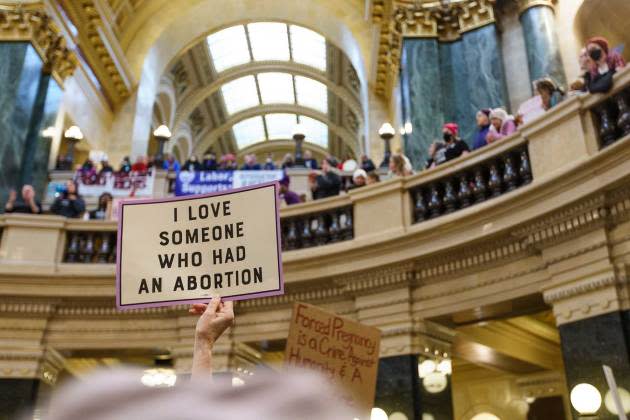The Record-Breaking Race That Could Decide the Future of Abortion in Wisconsin

On Tuesday, voters in Wisconsin will decide who they want to sit on the Supreme Court for the next 10 years. The jurist who wins that election will weigh in on hundreds of cases over the next decade, but for many doctors the race is about just one of them: the lawsuit that will determine whether a 1849 ban on abortion remains in effect.
The Wisconsin law makes it a felony to perform an abortion at any stage of pregnancy. The law — rendered dormant for five decades by Roe v. Wade — went back into effect last year and remains in effect, despite a challenge from the state’s attorney general.
More from Rolling Stone
Florida GOP Hold Child Healthcare Hostage to Rush 6-Week Abortion Ban
Wyoming Judge Temporarily Blocks Enforcement of Abortion Ban
North Dakota Supreme Court Blocks Law Criminalizing Abortion Services
If the court upholds the ban, many of those doctors — like their colleagues in states like Idaho, Texas, and Tennessee — will be forced to consider whether to continue practicing medicine in such a hostile environment, or leave the state.
Dr. Kristin Lyerly has already stopped working in Wisconsin. “It’s just not safe for me to practice any kind of medicine,” Lyerly, a plaintiff in the lawsuit against the 1849 law, says. Instead, two weeks a month, she travels to a rural area of Minnesota roughly seven hours from her home in Green Bay, where she provides obstetric care.
“Abortion care is integrated into every aspect of women’s health care,” Lyerly says. “A miscarriage is a spontaneous abortion, so managing a miscarriage could be considered an abortion. Helping someone with an ectopic pregnancy: if there’s cardiac activity there, that could be considered an abortion. If someone has a complicated pregnancy where their water breaks at 17 weeks and you save their life by acting sooner than the time that their life is imminently in danger — which is the appropriate thing to do — that is an abortion.”
Each of those scenarios is one in which she would feel compelled to provide care, but in Wisconsin, doing so could put her, or any doctor, in legal jeopardy. One colleague called Lyerly recently concerned that she might be at risk of prosecution simply because a patient informed her that she had obtained abortion medication online.
No doctor has been charged under the law yet, and district attorneys in Milwaukee and Dane Counties, where three of the state’s four former abortion clinics are located, have said that they will not prosecute cases using the 1849 law. But Joel Urmanski, a district attorney in Sheboygan County — where the state’s fourth clinic is located — has declared he would prosecute. (Urmanski has also filed a brief asking the court to uphold the 1849 law.)
The confusion over the archaic law has put health care providers in an impossible position. Already, a number of pregnant people have been denied care because of the looming threat of prosecution; in one documented case, a Wisconsin woman bled for 10 days after ER staff were reluctant to help her manage an incomplete miscarriage.
“You just don’t know what a DA might charge you with,” Lyerly says. “It’s affecting the way that all of my colleagues are providing their care — not just OB-GYN doctors, but also family medicine doctors, emergency medicine doctors, pediatricians, radiologists, you name it. Everybody is feeling this chilling effect.”
Those concerns prompted more than 300 health care providers in Wisconsin to sign a letter endorsing Judge Janet Protasiewicz in Tuesday’s election. The race pits Protasiewicz, a Milwaukee county judge who has campaigned as a champion for choice, against Daniel Kelly, a former member of the state Supreme Court endorsed by the state’s most prominent anti-abortion groups, including Wisconsin Right to Life, whom he’s worked with in the past.
Dr. Shefaali Sharma, an OB-GYN based in Madison, says she’s had numerous conversations with her husband about whether they can remain in Wisconsin. If the ban remains in place, she says, they would be forced to seriously consider “how sustainable it is for us to stay in this state — in terms of being a physician, but also in terms of raising a family here and allowing them to have autonomy of their bodies.”
If the Supreme Court flips, and Kaul wins his lawsuit, Wisconsin will be the first state that has outlawed abortion since Roe to reverse course and legalize it once more. Already, more than $45 million has been spent by the candidates and outside groups, making the race the most expensive of its kind in U.S. history — three times more expensive than the closest runner up.
Given the stakes, it’s unsurprising. If conservatives maintain their hold on the court, Sharma is concerned things could get much worse in Wisconsin — not just for health care providers, but for their patients. “At this point, the laws are only against physicians, but what if the laws become more strict, and women could be punished? I think it’s not a matter of do we stay in 1849 or do we move to 2023? But more: if we stay in 1849, or are we going to slide even further back?”
Best of Rolling Stone
